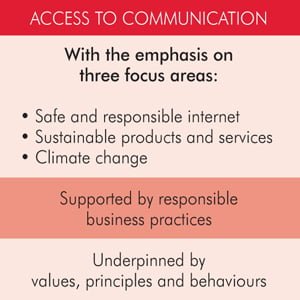
Vodafone is a leading international mobile communications company with interests in 27 countries and partnership agreements with a further 40 countries, including Safaricom in Kenya. It has over 71,000 employees throughout the world and in 2008 had more than 289 million customers. In the UK, more than 19 million people use Vodafone services.
Vodafone’s vision is ‘to be the world’s mobile communications leader and a key component of this is to ensure that customers trust and admire the company. It achieves this by taking a responsible approach to the way it conducts its business. This enhances its reputation and builds customer loyalty. Vodafone’s business strategy and its Corporate Responsibility (CR) strategy are interlinked. Vodafone believes that long-term commercial rewards come from doing business in a sustainable way.
Vodafone’s approach to business is two-fold:
- to provide product extension – new features, dimensions and services in saturated markets. These are areas like the UK, USA and Europe which have sophisticated users who want and expect new functions from their mobiles. Developing new ways of delivering products and services helps to keep existing customers and attract new ones. For example, 3G technology has improved the ability and quality of transferring voice and data. Very fast internet speeds allow extended services such as video calling, music downloads, mobile television and email messaging.
- to look for opportunities in emerging markets. These include some of the worlds”s more remote areas, including parts of Africa, where many people do not yet have access to a mobile phone. The less developed infrastructure in these areas makes traditional landline telecommunications difficult. Vodafone is committed to providing these markets with the technology to develop communication that will help both economically and socially. There are now more than four billion mobile phones across the world and 64% of all users live in developing countries.
This case study highlights Vodafone’s activities in different types of economies and the impact of technology on both developed and developing markets.
What is an economy?
An economy is a system which tries to balance the available resources of a country (land, labour, capital and enterprise) against the wants and needs of consumers. It deals with three key issues:
- what is produced
- how it is produced, and
- who gets what is produced.

There are three main types of economy: planned economy, market economy and mixed economy. Planned (also known as command) types of economies were found in previously communist countries, such as Romania, Bulgaria and Russia, and in North Korea today. In a planned economy the government makes all decisions for society. Producers only make what they are instructed to make. The main benefits are that most workers are employed and most people enjoy a similar basic lifestyle. The problems, however, may be far-reaching:
- a planned economy gives little capacity for development, so growth and investment are limited
- the infrastructure is usually under-developed as government spending on other areas such as defence
- wages are state-controlled, so people have less motivation to perform at higher levels
- prices are fixed by the government. Consumers often cannot afford luxury goods such as computers or mobile phones, which are taken for granted in developed countries.
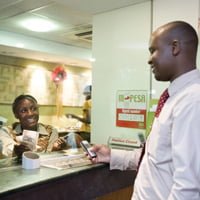
In market economies (also known as free enterprise) the government’s role is limited to providing legislation to protect businesses and consumers and making sure no single business or organisation restricts competition. It also provides essential services (like police and defence) and ensures the country’s money supply is stable. The main features are:
- businesses are motivated by profits to make products that customers will buy
- customers’ demand for products and services affects the levels of supply and the pricing
- if customers do not buy and demand falls, then a business must make less, be more efficient or produce an alternative product.
There are few, if any, examples today of countries with a purely free market economy. A purely market economy could have several drawbacks. It could lead to inequality in society. For example, those who can afford to pay for health care receive it, and those who cannot pay, do not. In times of economic crisis, without government intervention, many businesses, such as major banks which have a fundamental role in the nation’s economy, would fail.
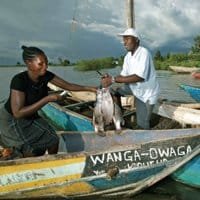
The mixed economy is a combination of both planned and market economies. Most countries demonstrate a mixed economy, including the most developed countries like the UK and the USA. Even a communist country like China has an economy which relies on a mixture of state and private enterprise:
- In a mixed economy, the government contributes and controls some resources and the market controls the rest.
- The proportion of each contribution may vary. For example, in some Scandinavian countries, the state provides a very high level of social benefits but charges high taxes. In the USA, public benefits (such as free national health care) are minimal. The UK position is somewhere in between.
Developed economies
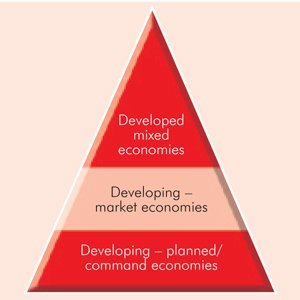
Developed mixed economies such as the UK produce large numbers of goods and services to meet consumer needs. This sector represents the top of the socio-economic pyramid. In this type of economy, where customers have a choice, Vodafone needs to differentiate itself in the market. It relies on its strategic mix of innovation in products and services, customer focus and its responsible approach to business to meet consumer demand and develop long-term customer relationships.
Vodafone’s business model is market-orientated and customer-focused. It researches customer needs and desires and produces products and services to meet those needs. For example, in the UK’s developed market, Vodafone provides its customers with the benefit of:
- network coverage for calls and data across almost 100% of the population
- a wide range of handsets and airtime plans to suit every type of customer and use
- access to messages, email, the internet and the sharing of images, videos and music through mobile phones.
In developed economies, mobile phones are considered a normal part of life and the functions they provide add value to landlines. Customers expect increasingly sophisticated products. Vodafone’s integrated mobile system can be used for business, education or socialising. The latest handsets allow people to keep in touch with family and friends through emails, messaging and networking sites such as Facebook and Twitter. They can research and develop their interests online or play games, listen to music or watch TV in any location.
Developing economies
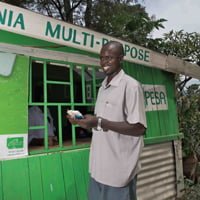
Developing economies are those countries in the middle or bottom layers of the socioeconomic pyramid. These countries often face great difficulties in improving their economies. For example, in planned economies, assets like land or property are owned by the government. Individuals and businesses are not used to making decisions and operating to make a profit. When Bulgaria moved from its previously planned economy to a mixed economy at the collapse of the Soviet Union, its agriculture, banking system and industry were not able to support the levels of output the economy needed. However, with investment, economic growth is now growing at a steady rate and Bulgaria was able to join the European Union in 2007.
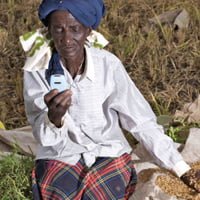
Developing economies, like many emerging African nations, may also be market economies but share features which hold them back:
- the population lives on very low incomes (typically less than $2 or about £1 per day)
- poor infrastructures such as transport (roads or railways) or local government
- poor communication systems
- low levels of basic health and education
- a low Gross National Product (GNP).
Kenya is a developing market economy. Its infrastructure and communications are extremely poor. Over 75% of the country’s workforce is in agriculture which can be affected by the climate. Telephone landlines are scarce, expensive and difficult to install. Kenya has just 450 bank branches which are based in cities and tourist areas. 80% of Kenyan adults have no bank account. Many of these are self-employed business people, such as small farmers. Only 27 % have access to a bank because of the remote distances involved. In addition, theft is a problem in many areas. These problems mean that small businesses find it difficult to operate.
The impact of technology on developing countries
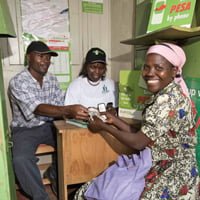
Over the last 20 years or more, mobile telecommunications and the internet have made great leaps forward. Vodafone is a market leader in opening up access to people and information around the globe 24 hours a day. The connectivity provided by mobile phone technology supports economic development. Its impact on a developing country like Kenya has been extremely positive. Many families live in vast, remote areas of the countryside. Installing landlines over those distances is expensive and difficult.
Families are often separated as the main earners are forced to live and work in the townships in order to earn enough to keep their families. Many are self-employed small farmers or tradespeople such as plumbers and builders. For small businesses, better access to mobile technology means that they can advertise to a wider audience and do not have to rely for work on word-of-mouth. They can be sure that clients can contact them with ease.
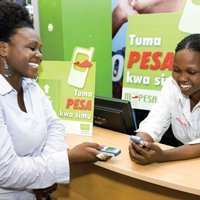
Vodafone in partnership with Safaricom also recognised the need to improve the movement and security of money to allow small businesses to grow. As a solution, Vodafone set up M-PESA (literally ‘mobile money’) working with funding from the Financial Deepening Challenge Fund (FDCF). This is a UK fund established to aid international development. A mobile network is quick and easy to install and less expensive to run than landlines. M-PESA provides a simple, secure, low-cost money transfer system:
- A customer goes to an accredited M-PESA ‘top-up’ shop and, in return for cash, has credit registered on their phone via the M-PESA system (rather like a pay-as-you-go top-up).
- The customer receives a text message to confirm the transaction. They can either store this on their phone until needed or they can forward it to someone else. When needed, the credit can be converted back into cash at any registered M-PESA agent or even via an ATM (cash) machine.
- Vodafone takes a small commission on the transfer.

There are over 2,200 M-PESA registered agents in petrol stations, supermarkets and other retail bases across Kenya and five million subscribers. The service has lots of benefits. For example, M-PESA has helped small businesses such as taxi drivers by enabling them to receive money for fares without having to drive around with lots of cash in their cars. The service was particularly helpful during a recent conflict in the country as it helped people to transfer money safely. M-PESA has also been used to buy everyday items, as well as to pay the rent, send funds to other people or buy phone airtime. It has even been used to pay school fees, as secondary schooling is not ‘free’ in Kenya. By providing safe, secure transfer of money, Vodafone’s M-PESA system has:
- helped small businesses become more financially secure
- provided a safe way for wage earners to send money back home to their families
- solved the problems of carrying large amounts of cash.
Following these achievements in Kenya, Vodafone has extended M-PESA into other emerging markets including Tanzania and Afghanistan.
Conclusion
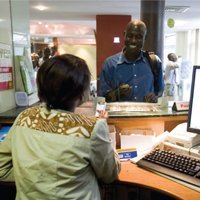
Vodafone uses the capabilities of the mobile phone to bring value to both developing and developed economies. The impact of mobile technology on developed markets over recent years has been immense and has focused on providing added value to customers through new and improved functions and features. By comparison, the impact of technology on emerging markets such as Kenya has provided a real lifeline both to individuals and to small businesses. The mobile phone has helped economic development in emerging economies. With the growth in the provision of mobile phones, Vodafone has enabled great improvements in facilitating the flow of money and information, which is vital for economic growth.
By improving Kenya’s telecommunications infrastructure and by providing the M-PESA system, Vodafone has enabled more people to access and transfer money. This has also helped socially by helping people to take advantage of employment opportunities away from their hometowns and villages.
